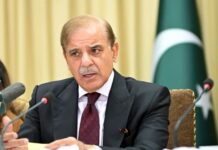ISLAMABAD: The Ministry of Finance (MoF) spokesperson here on Sunday said that despite facing various challenges, Pakistan’s ‘economic fundamentals’ remain strong.
The early indicators of the economy, such as the strong growth of LSM sector during July- August FY2017, better crop production estimates and increasing exports, remittances, and FDI, all indicate towards improvements in macroeconomic conditions.
Rejecting the news item in a section of media that Pakistan’s macroeconomic conditions have significantly worsened based on a World Bank (WB) report, he said that the assessment of the contributor of the news item is neither based on facts nor does it appropriately capture the assessment of the economy presented in the bank’s report, which is balanced positively overall, and recognises economic achievements of past 4 years.
The spokesperson said that the news item chooses to ignore the positive side of WB’s assessment which suggests that Pakistan has made good progress in making its economy more stable. He added that to continue with an upward growth trajectory and sustain the hard-earned achievements, Pakistan will need to continue with economic reforms and pursue pro-growth policies.
He further informed that the report has highlighted that FDI has increased and inflation is likely to increase on account of increase in aggregate demand and bullish economic prospects. Likewise, the aggregate consumption will grow on account of recovery in remittances, the report added.
The report also said that the services sector will grow due to a healthy contribution from its sub-sectors, whereas industrial sector will continue to grow due to an improved power supply and CPEC. The agriculture sector will also expand, it added.
The spokesperson informed that the report notes that external public debt as a percentage of GDP continues to decline and the official exchange rate remained stable in FY2017 and credit to private sector picked up.
The report has also pointed to challenges of fiscal and external imbalances, and stated that these could affect the country’s growth prospects, if not addressed, he said. He added that Pakistan government understands that these are mid-course corrections which are taking place in the macroeconomic framework, while overall there is no reversal from the path of stabilisation.
He said that the government is aware of the challenges and is firmly committed to maintaining macroeconomic stability while achieving pro-poor inclusive higher economic growth of 7 per cent in the medium term.
The spokesperson also said that an overview of macroeconomic indicators of the country clearly speaks of Pakistan’s economic resilience despite the slowdown in the global economy. “Our current account deficit widened to US $12.1 billion during FY17 as compared to US $4.9 billion in FY16,” he added.
He noted that the increase was mainly due to increase in imports of machinery, industrial raw material and petroleum products. “These imports enhance the productive capacity of the economy for higher outputs and exports in future,” he said and added that due to stabilising security environment and uninterrupted power supply, Pakistan’s export performance has returned to growth zone.
“Exports during July-September of FY2017 posted a healthy growth of 12.4 per cent as compared to the same period last year. Imports have started to taper off due to corrective measures of the government. Workers’ remittances have also returned to growth zone,” he informed.
He said that in July-October FY2017, remittances have shown a growth of 2.3 per cent and FDI inflow during July-October has also registered a growth of 57 per cent. He added that the recent pressure on the external account is only short term and will peak out this year as various energy and infrastructure projects are completed.
The spokesperson further informed that the S&P has recently reaffirmed Pakistan ‘B’ short-term and long-term ratings with a stable outlook. S&P has also acknowledged that Pakistan’s external account challenges are short-term and will recede within two years’ time, he added.
“The WB has assumed 5.5 per cent GDP growth for the current fiscal year while the projected growth is 6 per cent,” he concluded.
























